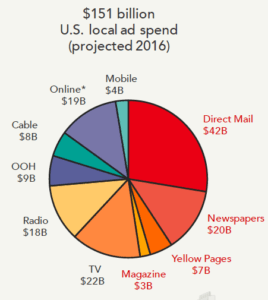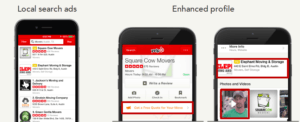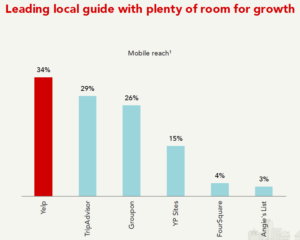Yelp – discovery engine for local businesses

How adding value to both sides and using network effects to their advantage, Yelp has become the go-to-place to discover local businesses. But is that sustainable?
 Founded more than a decade back, Yelp has become the go-to-place to discover local businesses. With 115M reviews of more than 3M local business, Yelp is by far the largest players in this space in the US. Yelp is playing in the $150B+ local ad spend market in the US of which ~$20B happens online.
Founded more than a decade back, Yelp has become the go-to-place to discover local businesses. With 115M reviews of more than 3M local business, Yelp is by far the largest players in this space in the US. Yelp is playing in the $150B+ local ad spend market in the US of which ~$20B happens online.
Value Creation:
Yelp serves two sides of the platform: local business and consumers. For consumers, over time Yelp has become the destination to search for local business ranging from upcoming restaurants to finding local plumbing shop. Consumers can rate and write detailed reviews about their experience with the local business and those reviews are used by other users to sort through the clutter and find the right business they want to work with. These extensive reviews form the core value proposition of the Yelp platform for the users.
From businesses perspective, Yelp helps them maintain an online presence through their “business page” on Yelp. It helps users discover these local businesses and hence, driving user traffic to the stores. Yelp reviews also help differentiate business based on the quality of services provided by them as reflected by Yelp reviews. Studies have shown that increasing one-star rating on Yelp leads to 5-9% increase in revenue for local business [Prof. Michael Luca, HBS]
Value Capture:
The breadth and depth of reviews on Yelp creates a network effect for the platform. Since there are already more reviews on Yelp, users come on Yelp to discover local business and then write/rate more business, in turn creating the network effect which has given Yelp more than 115M reviews. Every new user/review add direct value to all other users on the platform and add more incentive for business to be present on the platform.
 To keep the virality and network effect growing on the platform, Yelp does not charge the users rather incentives them (in form of Elite Status etc.) to discover and keep writing reviews. Yelp also does not charge business for a basic presence on its platform but monetize for creating an enhanced presence through local advertising. Yelp has a large sales team for convincing local business to advertise on the platform that resulted in ~$800M revenue last year. With a large market size of $20B online local ad spend just in the US alone, Yelp has a long way to go.
To keep the virality and network effect growing on the platform, Yelp does not charge the users rather incentives them (in form of Elite Status etc.) to discover and keep writing reviews. Yelp also does not charge business for a basic presence on its platform but monetize for creating an enhanced presence through local advertising. Yelp has a large sales team for convincing local business to advertise on the platform that resulted in ~$800M revenue last year. With a large market size of $20B online local ad spend just in the US alone, Yelp has a long way to go.
Yelp also captures value by facilitating transactions on the platform such as booking a restaurant/spa appointment, ordering food, requesting quotes from local business etc. This leads to better user experience and deeper integration with the business and is a clear way forward for Yelp to be the market leader in local business discovery market. Deeper integration with business would allow Yelp to minimize the multi-homing on both user and business end.
This space of local business discovery has very hyper-local network effects – as a user, I care most about the local business in my area. This naturally limits the expansion of Yelp in other geographies where local players (like Zomato, TripAdvisor, Angie’s List etc.) already dominates the market. With the proliferation of social networks, it is getting easier for users to discover the places that their friends recommend/like, resulting in fewer discoveries on Yelp. Also, using the distribution of Android and Google Maps, Google is increasingly pushing users to rate/review local business and thereby threatening the core value proposition of Yelp.
In spite of these challenges, some peculiarities of this market play really well in Yelp’s favor. First, it is extremely difficult to get local business on a particular platform – Yelp has a large sales team (500+) dedicated to this task, whereas both Google and FB would likely not go down that path. Second, 80-20 rules apply for users writing the reviews where very few users write majority of the reviews. With Yelp Elite program, Yelp has done a great job in keeping these users loyal to the Yelp platform. Lastly, Yelp has started investing heavily behind deeper integration with local business through SeatMe (appointment booking), Eat24 (food delivery) etc. in the hopes of locking in business to its platform.
In summary, Yelp has an extensive network effect going on both sides of the platform and has a strong moat because of the breadth and depth of user reviews. It has also started making the right moves in increasing engagement and integration with the business. It will be interesting to see how this space will evolve in the next 5-10 years.
[Disclosure: I will be joining Yelp for full-time post HBS]




Great post Anish! Do you think Yelp has been able to successfully communicate it’s evolved and broader offering of services (e.g. – you mentioned plumbing as an example)? For me, it still stands as the go-to for restaurant reviews which it built out so well at its inception, but I don’t think Yelp when I’m trying to find a contractor to remodel my house. The reason I ask is because of other offerings like ThumbTack which have tried to carve out a niche for services like plumbing, electricians, etc… Are these services a threat to Yelp? How do you think Yelp will respond?
Good question, Felix and I think in my mind as well, Yelp stands out for the go-to place for restaurants. But 30% of their advertising revenues comes from Home & Local services as compared to only 15% from restaurants. So there are many users who use Yelp for discovering other local businesses and not just restaurants.
On your point around ThumbTack etc., I think they are definitely a competitive threat to the Yelp’s most important category. To counter that, Yelp has released few features in recent times like “Request to Quote” and “Messaging with local business” that makes it easier for users to communicate with business in a similar fashion as ThumbTack.
Good question, Felix and I think in my mind as well, Yelp stands out for the go-to place for restaurants. But 30% of their advertising revenues comes from Home & Local services as compared to only 15% from restaurants. So there are many users who use Yelp for discovering other local businesses and not just restaurants.
On your point around ThumbTack etc., I think they are definitely a competitive threat to the Yelp’s most important category. To counter that, Yelp has released few features in recent times like “Request to Quote” and “Messaging with local business” that makes it easier for users to communicate with business in a similar fashion as ThumbTack.
Congrats on joining Yelp post-HBS!
As Yelp continues to expand its platform and integrates with different kinds of businesses (e.g., Whittl, delivery.com, Peek, others), which new verticals do you think offer the greatest opportunity for growth given that you mention local players like Angie’s List already dominate in some markets? Also, how are they planning to eventually scale the platform? I know it launched back in 2013. Is the platform open to all developers, or just a select group of alpha partners?
Thanks Libby, these are some good questions and I am sure Yelp is thinking about adding more categories depending on the traction they see on the platform. As per my readings, these companies are all alpha-partners as Yelp want to keep the quality in check of the partner. In my opinion, it is more critical to solve the adoption issue on the merchant side (e.g. Spas signing-up to book appointments through Yelp etc.) than getting more partner services as even with so many platform partners, only ~100K of 3M business accepts transactions on Yelp.
Refer this for some recent partner additions: https://www.yelpblog.com/2016/06/yelp-platform-100000-businesses-5-new-transaction-partners
Great post Anish! Yelp is one of my most frequently used apps so I am definitely a fan. Speaking of Zomato – when I was in Australia and NZ, I had to download it since Yelp’s presence is weak. However Zomato’s search results are horrific. When I entered a search word the app would only show results with the exact word in the restaurant name and some other seemingly irrelevant locations…Zomato is also super disorganized (no captions on photos, etc.). It seems like you’ve taken on the stance that Yelp should not aggressively expand to regions with dominant players but do you see a way for Yelp to win with its superior product in those markets?
Thanks Chun! I am pretty surprised to hear that about Zomato. I used to frequently use it back in India (Zomato’s main market) and I love the interface that they have. Your experience reinforces the fact that you need a lot of reviews and business to be on the platform for it to be useful to the users. It takes a lot of time and resources to gather the data required to build up the inventory of business and then crowd-source the reviews from the users – that is the biggest moat each of the players has in its core market. Hence, I will be skeptical of expanding aggressively in other markets where local players already dominate the market without access to lots of capital.
For more details, I think this blog would be useful to understand Yelp vs Zomato – https://medium.com/@nikhilbd/why-zomato-is-better-than-yelp-in-some-markets-ce2ae6073136#.ysqvc7mzk
Anish – Love the post! You mention that Yelp is now integrating with businesses in other verticals (other than food) which is contributing to a sizeable portion of Yelp’s revenue. How do you think Yelp will compete with Google Nearby feature (which you mention briefly as well)? Similarly, Facebook SMB strategy (https://www.clickz.com/How+Facebook+is+focusing+on+SMBs+in+2016) also poses a threat to Yelp.
Deeper integration with business makes total sense but are businesses really not going to multi-home? Having worked in Grubhub, this is one of the challenges we saw with the emergence of multiple food ordering/delivery platforms. At the end of the day, it’s a strong network effects game and Google / Facebook has billions of users and can disrupt Yelp any day. What do you think?
Further, we discussed AI platforms like Alexa, Google Home, Jibo in LTV class this week. How do you think that’s going to shape Yelp’s initiatives going forward?
Thanks Mohit. As mentioned in my post above, both Google and Facebook pose threat to Yelp but there are certain market characteristics that play in Yelp’s favor – owning a large sales team to convince SMB’s to maintain an online presence and loyalty of Yelp’s Elite users. Yelp is still the go-to platform for discovering local businesses, especially Restaurants. The sooner they become the go-to place for all other business and doing transactions with business, the better for Yelp. It is hard to change user behavior for Google/FB once users become loyal to a particular platform and Yelp has a strong moat with user reviews.
On your second question around the emergence of voice-platform, I haven’t read anything yet on what is Yelp planning to do. Given the nature of local business discovery and the inherent need for visual cues, I am not sure if these platforms are a right fit for the current version of Yelp’s product. However, instead of discovering/evaluating businesses, Yelp can potentially become the recommendation engine for local business powering all these voice-based platforms.